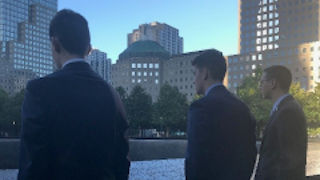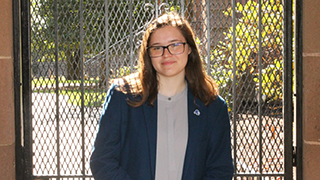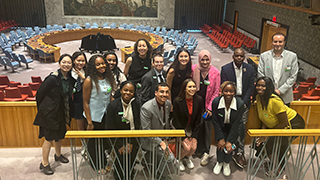"Commemorating 9/11": A Discussion on Counterterrorism and Diplomacy
Monday, October 11, 2021

Dr. Courtney Smith, acting Dean of the School of Diplomacy began by highlighting the event as an opportunity for reflection on the emotions brought by 9/11 and the challenges the U.S. has faced in the years since the attacks. Each panelist was then introduced and given a chance to speak about the effects of 9/11 through their viewpoints.
The panel began with an address from Ambassador Westphal, who focused on the events leading up to 9/11, and the essential element of communication that was lacking. Ambassador Westphal affirmed that, in terms of inter-agency communication, "changes began to happen after the 9/11 Commission and its report." The ambassador affirmed that this communication, along with communication with Saudi Arabia, allowed the U.S. to focus its attention on ISIS in Syria and Iraq, preventing their expansion.
Rear Admiral Douglas Fears then spoke about the increase in counterterrorism efforts by the U.S. government and the reason that terrorism seemed seems so present today. Admiral Fears agreed with Ambassador Westphal that terrorism has always been present, but stated that the reason the U.S. had been shielded from much of its effects was the two large oceans on either side of the nation. Admiral Fears also spoke to the creation of the Department of Homeland Security in 2003 and how it forced the nation's counterterrorism leaders into one shared space.
Lt. Col. Brian Pryce then spoke on the successes and failures that resulted from the 9/11 attacks. Price again highlighted the new sense of cooperation between different governmental agencies, as well as the prevention of large-scale attacks on U.S. soil since 9/11, and the U.S. mastery of kinetic strikes against specific targets. Price then pointed out the failures of identifying counterterrorism strategic ends, the importance of private-public partnerships, and acknowledged that the military is only part of a successful counterterrorism effort.
The discussion then moved into a question-and-answer session, with Walser asking the panel how they felt about the War on Terror being compared to the War on Drugs, and the question of management over victory. Each panelist agreed that calling counterterrorism operations a "war on terrorism" was flawed in that it implied that there would be an end to terrorism. The response was summarized by Lt. Col Price, who stated that while there would never be an end to the war on terrorism, any politician who wanted to call it something else would "look like you're soft on national security and soft on terrorism," though he believes that the best way to look at terrorism is like a cancer that can be controlled but not eradicated.
The discussion closed on the question of what each panelist would submit as a necessary change in the ongoing war on terrorism. Admiral Fears suggested that it was necessary for there to be more clarity on the end goal of counterterrorism efforts. Ambassador Westphal agreed, adding that it would also be beneficial to move counterterrorism from a political to strategic environment. Lt. Col. Price concluded by saying that there should be a focus on values and knowing who we are and what we want.
Closing the event, Dr. Catherine Ruby, Seton Hall's Director of Internships and Career Development within the School of Diplomacy and International Relations, thanked the panelists both for their service and for sharing their insight on past and future events.
Categories: Nation and World






